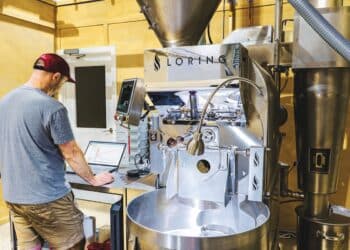New research from the Technical University of Munich suggests genetics may play a role in why some people find coffee more bitter than others.
Like coriander, olives, pineapple on pizza, coffee often falls into the love-hate category. It divides opinion, with one camp loving its bold, complex flavour profile and the other declaring it too bitter and undrinkable.
While the discussion has rumbled on for years, new research from the Leibniz Institute for Food Systems Biology at the Technical University of Munich in Germany has come closer to concluding why there’s variation in how people perceive the bitterness of coffee.
Caffeine has long been known to create a bitter taste, yet decaffeinated coffee still displays these qualities. This fact led Leibniz’s team of researchers, led by Principal Investigator Dr Roman Lang, to explore which other substances contribute to the bitter flavour of coffee. As a result, they’ve identified a new group of bitter compounds in roasted Arabica coffee as well as a genetic disposition determining how bitter these substances taste.
“Previous studies have identified various compound classes that are formed during roasting and contribute to bitterness,” says Coline Bichlmaier, a doctoral student at the Leibniz Institute. “During my doctoral thesis, I have now identified and thoroughly analysed another class of previously unknown roasting substances.”
Bichlmaier first looked at mozambioside, a compound found in Arabica beans that tastes about 10 times more bitter than caffeine and activates two of the 25 bitter taste receptor types (TAS2R43 and TAS2R46) in the human mouth and the cells of other organs and tissue.
“Our investigations showed that the concentration of mozambioside decreases significantly during roasting, so that it only makes a small contribution to the bitterness of coffee,” says Lang.
“This prompted us to test whether roasting produces breakdown products of mozambioside that are also bitter and could affect coffee’s taste.”
The research team report that seven different degradation products of mozambioside are produced during roasting and are found in coffee in fluctuating concentrations, influenced by roasting temperature and duration.
These products almost entirely pass into the beverage when brewed, and a cellular test system demonstrated that they activate the same bitter taste receptors as mozambioside. Three of the products are believed to have an even stronger impact on the receptors than mozambioside.
However, the researchers stress that the concentrations measured in brewed coffee were too low to induce a noticeable taste. In a sample of 11 test subjects, the combination of mozambioside and its roasting products led eight participants to perceive a bitter taste, while two didn’t perceive any particular taste and one found it to be ‘astringent’.
The researchers used a genetic test to show that this taste sensitivity was influenced by the genetic predisposition of the test subjects. Two participants had both copies of the TAS2R43 gene variant defective, seven had one intact and one defector variant of the receptor, and only two people had both copies of the gene intact.
“The new findings deepen our understanding of how the roasting process influences the flavour of coffee and open up new possibilities for developing coffee varieties with coordinated flavour profiles. They are also an important milestone in flavour research, but also in health research,” says Lang.
“Bitter substances and their receptors have further physiological functions in the body, most of which are still unknown.”
Lang, Bichlmaier, and team believe there is more research to be done in this area. They say there are many more bitter substances in coffee that are not yet known, despite the fact that around one billion people drink the beverage each day.
This article was first published in the March/April 2025 edition of Global Coffee Report. Read more HERE.





